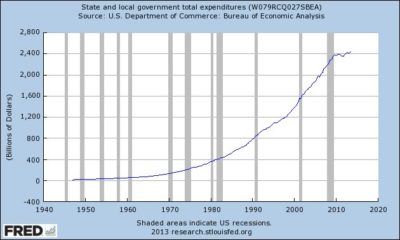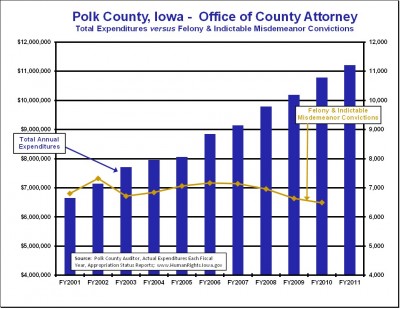 We concluded last month’s message on fund-raising tactics needed for your efforts to roll back local government or to stop a massive, unneeded increase. But how do we overcome the government propaganda that so often works?
We concluded last month’s message on fund-raising tactics needed for your efforts to roll back local government or to stop a massive, unneeded increase. But how do we overcome the government propaganda that so often works?
A familiar message by local governments, of all kinds, is the never ending mantra, “We are over-worked and underpaid.” By and large this message has provided the background context to their annual question during budget season – “How much are you going to make us cut from the requested increase in our budget?!” They rarely consider a real decrease. As mentioned last month, the Madison County, Ill., county treasurer proved this wrong by “pink slipping” 30 percent of his staff 30 days after being elected to office, while improving services to taxpayers.
Too many of the public believe this myth at least until the next property tax statement comes in the mail. But even then, many people too often react, “Well, if they are underpaid and my property taxes are going through the roof, where is all the money going?” It is propaganda and as such serves to seduce people into believing black is white. They are anything but underpaid. Take a look at the big picture below from the St. Louis Federal Reserve bank demonstrating, nationwide, this is a grand lie!
With the exception of the last few years, the growth curve of state and local government spending has been explosive since 1980. Your challenge is to bring this into the public’s awareness where you are engaging in an opposition campaign with a local government jurisdiction seeking more debt or spending authority from the voters. If you are new to the scene you will be up against decades of this propaganda. But it can be overcome.
Keep It Simple And Pictures
Most voters want complex financial information and trends in pictures. Your team needs to recruit a volunteer accountant or CPA who has a special distaste for excessive local government. His/her work should be kept very confidential, per their request, and knowledge of their assistance limited to very few in your committee. They need to help you look at the local jurisdiction’s spending patterns, over time.
Take a hard look at the true state of public education…
Here’s a critical rule in this process. Local counties, cities and school districts will almost always compare themselves laterally with their peers — those peers selected who are most often spending more than they are. This serves to make them appear underfunded. The problem with this is that the taxpayers in those jurisdictions may be hurting even worse than you are.
 The comparison has to be between those spending the money to the average disposable income of those providing their local funds and then charted over time, or linearly. A ten year picture of the widening trend of local government salaries/benefits verses the average income in the community, will put in picture the local stress taxpayers have experienced. Local taxpayers also need to see the city’s or county’s spending pattern over the past ten years, compared to their outputs – (i.e., citizens served, student enrollment, program units, etc.) The costs are usually escalating while the outputs are rising slowly, stagnant or often going down!
The comparison has to be between those spending the money to the average disposable income of those providing their local funds and then charted over time, or linearly. A ten year picture of the widening trend of local government salaries/benefits verses the average income in the community, will put in picture the local stress taxpayers have experienced. Local taxpayers also need to see the city’s or county’s spending pattern over the past ten years, compared to their outputs – (i.e., citizens served, student enrollment, program units, etc.) The costs are usually escalating while the outputs are rising slowly, stagnant or often going down!
Suddenly, the picture tells a thousand words – they’ve been lied to! Here’s one of a host of possible illustrations, below. The Polk County, Iowa, attorney’s annual expenses have been rising from $6.7 million to $11.2 million over ten years (blue bars) while the trend in criminal convictions (gold line) is going down. When the public sees this you can start raising the question: If the county attorney will not begin to eliminate some assistant prosecutors, what’s he going to do to keep them busy? Encourage police harassment of ordinary citizens to make more work for his prosecutors?
Many local jurisdictions now post the last few years of their audited financial statements on their websites. A simple records request for financial statements going further back will often yield you the statements, or a link to the statements, from the department by return email in PDF format. Some state audit departments also post audited financial statements for all local jurisdictions in their state, going back for many years. A  good accountant should be able to review their funds flow statements and start pulling equivalent data for comparisons.
good accountant should be able to review their funds flow statements and start pulling equivalent data for comparisons.
When They Say ‘It’s All About The Kids’
When it comes to the local government’s purported ballot approved need, there is a significant governing principle to employ in your research and often later in your message. It is: Never concede the need driving the request for more money. Research it thoroughly. It is almost always a bogus fabrication.
If we lead with and focus on the taxpayer waste and they respond with “Do It For Kids,” we will almost always lose. We have to take the “Do It for Kids” agenda away from them. How do we do that? By making it clear: Too many children are receiving the school’s wasteful ‘spending lesson’ all too well and quickly entering into society buried in college debt, personal debt, household debt, etc. Take ownership of the message that the proposal before the voters sets an example of ‘poor money management’ for the children of the community. In fact, the best thing the district can teach the children is how to better manage their current assets and unchecked expenses. Teaching good financial stewardship is far more important to the children of the community than building a massive new sports complex, for example. After explaining this message in a few sentences we then make it clear, “Do What’s Best For The Kids, Join Us & Vote No!”
We always lead with this message – because it is true! Only then do we follow with the tax and spending arguments. Once the voter’s false guilt is assuaged, they are ready to hear the rest of your arguments.
Said one businessman, “We’ve fought the large metro school district for over forty years on their wasteful spending and they always responded, “It’s for the Kids!” and we always lost!” Yep!
There is false guilt manipulation tied to most major excessive spending or debt proposals by local governments. Learn it and learn how to challenge it at its root. That is the first major step toward rolling back excessive local government.
Sign up for Off The Grid News’ weekly email and stay informed about the issues important to you
 Off The Grid News Better Ideas For Off The Grid Living
Off The Grid News Better Ideas For Off The Grid Living




